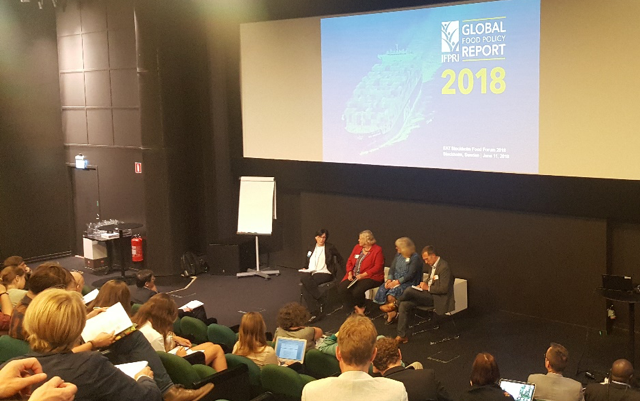The global trade in food will continue to play a key role in ensuring food security, nutrition, and environmental sustainability. However, trade policies must change to work for inclusive, sustainable food systems, experts at the June 11 Stockholm launch of IFPRI’s 2018 Global Food Policy Report said. This year’s GFPR focuses on rising anti-globalism sentiment—including threats of trade protectionism—in the landscape of food security.
“To achieve goals of human and planetary health, we will need to share resources more radically,” said Gunhild Stordalen, founder and executive chair of the EAT Foundation, which co-hosted the event. EAT Science Director Fabrice DeClerck moderated the session and IFPRI Director General Shenggen Fan presented an overview of the report discussing the challenges and opportunities of emerging global changes to the world’s food system.
While trade has not benefited everyone, Fan said, trade restrictions would cause much more economic pain. Both Fan and former Sweden Minister of Agriculture Annika Åhnberg said that government policies should address the negative impacts of free and open trade more directly. Indeed, the uneven benefits of trade have helped fuel anti-globalism sentiments in many countries; social protection programs must play a stronger role in assisting those displaced by the rapid economic changes associated with free trade, Fan said. Trade negotiations should also take into consideration broader issues, Åhnberg said, including nutrition, anti-microbial resistance, and environmental problems.
Trade restrictions can lead to catastrophic outcomes, warned Claudia Ringler, deputy director of IFPRI’s Environment and Production Technology Division (EPTD). Panicked restrictions on the cross-border movement of food, as seen in the 2007-2008 food price crisis, can tighten food supplies where they are needed most, leading to increases in poverty, hunger, and malnutrition. Moreover, trade is important for environmental sustainability and climate action. “I can’t imagine what would happen if trade stopped,” she said.
World Agroforestry Centre (ICRAF) Southeast Asia Regional Coordinator Ingrid Öborn discussed the impact of globalization in the Southeast Asia region. Global integration, along with rapid economic growth, have put pressure on the natural resource base. Agroforestry is a potential solution that can address sustainability, gender, and social issues, but organization of farmers and government incentives and extension are key for agroforestry to reach its potential.
Fan concluded the session, observing that different countries require different approaches to trade in order to work for their smallholder farmers. In developed countries, smallholders can take advantage of e-commerce and the growing global middle class by producing and marketing high value niche foods. In developing countries, smallholders should be supported to move up to commercialization or move out to more profitable sectors. The global community must listen to different stakeholders, Fan said, to help them manage radical global changes facing the food system today.
Christopher Rue is a Senior Program Manager with IFPRI’s Director General’s Office.







